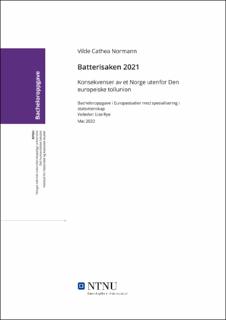Batterisaken 2021: Konsekvenser av et Norge utenfor Den europeiske tollunion
Bachelor thesis
Permanent lenke
https://hdl.handle.net/11250/3005278Utgivelsesdato
2022Metadata
Vis full innførselSamlinger
Sammendrag
Som følge av den nye handelsavtale mellom Den europeiske union (EU) og Storbritannia (brexit-avtale), ble det innført en toll på 10 prosent ved eksport av elbiler med norskproduserte batterier til Storbritannia (brexit-tollen). Brexit-tollen kom som en overraskelse for batteriaktører med høye ambisjoner om batterisatsing i Norge, såvel som den norske regjeringen. Det viste seg gjennom året 2021 at den norske standardoppfatning om at EU alltid ivaretar norske interesser, ikke nødvendigvis stemmer.
For å besvare forskningsspørsmålet om hvorfor den nye handelsavtalen mellom Storbritannia og EU ble et hinder for det norske batterieventyret og hvordan det søkes løst, var det hensiktsmessig å utføre et casestudie av «batterisakens» utvikling gjennom året 2021. Metoden tilførte en analytisk innsikt, ved hjelp av «process tracing» (PT) som tilnærming for grundig analyse av medieoppslag. Det konseptuelle rammeverket med innføring i Norges komparative fortrinn, EUs «grønne giv» og norsk tilknytning til EU, ga kontekst til funnene i analysen og gjorde det mulig å identifisere mønster til diskusjon. Den norske «standardoppfatningen» om at EU oftest ivaretar norske interesser stemte ikke overens med manglende rammeverk og forhandlingsmuligheter i lys av en ny brexit-avtale. Brexit-tollen utgjorde derfor et nevneverdig hinder, men viste seg ikke nødvendigvis som en avgjørende faktor for videre satsing. As a result of the new trade agreement between the European Union (EU) and the United Kingdom (Brexit agreement), a 10 percent tariff was implemented on exports of electric cars with Norwegian-produced batteries to the United Kingdom (Brexit tariff). The Brexit tariff came as a surprise to both the Norwegian government, as well as battery actors with high ambitions within battery investment in Norway. Throughout the year 2021, it turned out that the previous Norwegian attitude stating that the EU always safeguards Norwegian interests, it not necessarily true.
In order to answer the research question of why the new trade agreement between the UK and the EU became an obstacle to the Norwegian battery adventure, and how it is sought to be resolved, the thesis conducts a case study of the "battery case" development through 2021. The method provides analytical insight, using “process tracing” (PT) as an approach for a thorough analysis of media coverage. The conceptual framework consists of an introduction to Norway's comparative advantages, the European Green Deal and Norwegian affiliation with the EU, which provides context for the findings in the analysis and made it possible to identify patterns for discussion. The Norwegian standard view that the EU most often safeguards Norwegian interests did not correlate with the lack of a framework and negotiating opportunities seen in the context of a new Brexit agreement. Brexit tariffs therefore constituted a significant obstacle, however did not necessarily prove to be a decisive factor for further investment.
